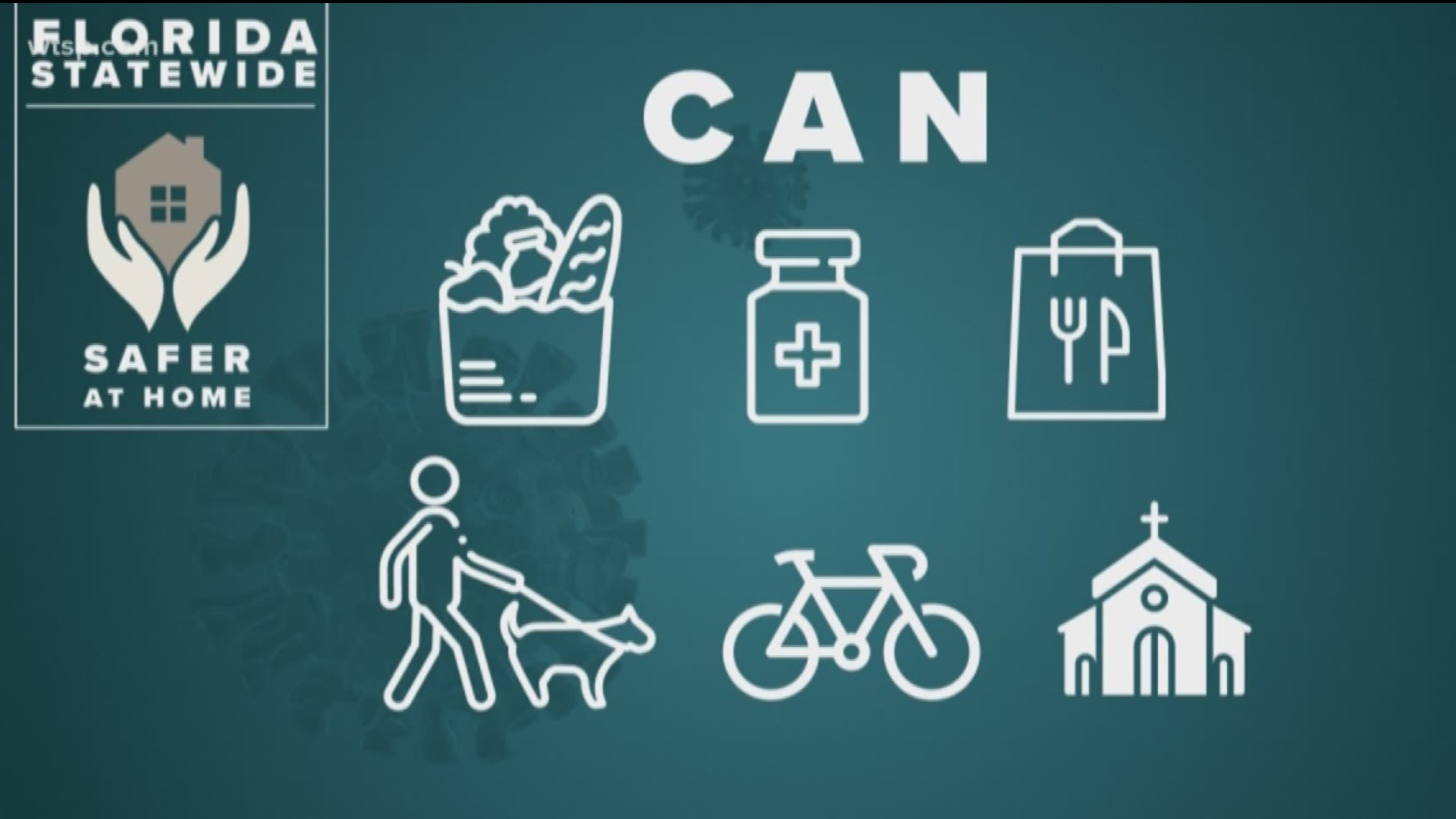ST. PETERSBURG, Fla. — Florida's statewide "safer-at-home" went into effect at 12:01 a.m. on April 3. With this new order, there may be some confusion on what policies are still in place from locally-issued orders.
Gov. Ron DeSantis clarified that his statewide order does supersede "any conflicting official action or order issued by local officials in response to COVID-19."
However, when asked about church attendance during a press conference, DeSantis said local governments may enforce stricter policies than the ones outlined in the statewide safer-at-home order, but they cannot make "looser" guidelines.
So, what does that all mean for you and your family?
Can I go to church?
According to the statewide order, yes. But, it's more complicated than that.
Gov. DeSantis said in a press conference Thursday that churches perform an important service to people in a time like this and are allowed to have services in-person, as long as they follow guidelines and practice social distancing.
However, Gov. DeSantis did say that local leaders can "go beyond his ask."
DeSantis encouraged those on the local level to collaborate with their local religious leaders to find an outcome that benefits both sides while still keeping people safe. Essentially, he suggested if county leaders want to impose stronger restrictions on religious services they can, but in the end, they cannot force a church to close entirely.
So, you might be able to go to church -- depending on where you live in the state and what local rules apply to you. For example, a local government could theoretically restrict the number of people inside the church, while still abiding by the governor's order. If you were able to get a seat in that example, then yes, you could go to church.
Can I get takeout?
Yes. While businesses that are deemed non-essential will have to close to the public, DeSantis said some non-essential businesses like restaurants can still operate and deliver food.
Can I go boating?
Yes. As long as you're practicing safe boating and social distancing practices and avoiding large groups of people.
The Pinellas County Sheriff's illustrated how safe boating should look in this video:
Boats must be 50 feet apart from each other, there should be 10 or fewer people on board the boat, and if you're on a boat, you should be 6-feet apart from everyone else.
Can I care for my family and friends?
Visiting family or friends to care for them is OK. But, for the most part, it's best to keep your contact with them virtual -- rather than physical. You're encouraged to avoid groups larger than 10 and are urged to stay six feet apart from others, as part of the broader social distancing guidelines.
Can I get my pet groomed?
Probably not. Dog grooming is not considered an essential service by Florida's safer-at-home order. Just like many of you are unable to see your hairstylist right now, your pup might have to get a little shaggy during the safer-at-home order.
What services are considered essential?
According to the Department of Homeland Security, the following are considered essential:
- Healthcare/Public Health (i.e. Hospitals and Doctors)
- Law Enforcement, Public Safety and First Responders (i.e. Police and Emergency Management Services)
- Food and Agriculture (i.e. Farmers and food manufacturers)
- Energy (i.e. Natural Gas and Nuclear facilities)
- Water and Waste water (i.e. Water Department)
- Transportation and Logistics (i.e. Trucking and shipping)
- Public Works and Infrastructure (i.e. Safety inspectors for public facilities including dams, bridges, etc.)
- Communications and Information Technology (i.e. maintainers of communications infrastructure, such as wireless, internet and cable providers)
- Community and Local Government (i.e. federal, state, local, tribal and territorial employees who support Mission Essential Functions)
- Critical Manufacturing (i.e. metals, PPE, supply chain minerals and employees that support other essential services)
- Hazardous Materials (i.e. healthcare waste and nuclear facilities)
- Financial Services (i.e. banks)
- Chemical (i.e. workers supporting the chemical and industrial gas supply chains)
- Defense Industrial (i.e. essential services required to meet national security commitments to the federal government and U.S. Military)
- Commercial Facilities (i.e. workers who support the supply chain of building materials)
- Residential/Shelter Facilities (i.e. workers in dependent care services)
- Hygiene Products and Services (i.e. laundromats, personal and household goods repair and maintenance)
- Florida Gov. Ron DeSantis issues statewide stay-at-home order. What does it mean?
- Model: Florida's coronavirus peak could come in early May, with hundreds of deaths daily
- Floridians onboard coronavirus-stricken cruise ship will be accepted in the state: governor
- Stimulus check calculator: See how much you'll likely be getting
- Hotlines, websites offer the latest on COVID-19
- Stay-at-home vs. shelter-in-place: Here's what they mean
- Texas family dances COVID-19 troubles away in viral 'quarantine challenge' video
FREE 10NEWS APP:
►Stay In the Know! Sign up now for the Brightside Blend Newsletter



